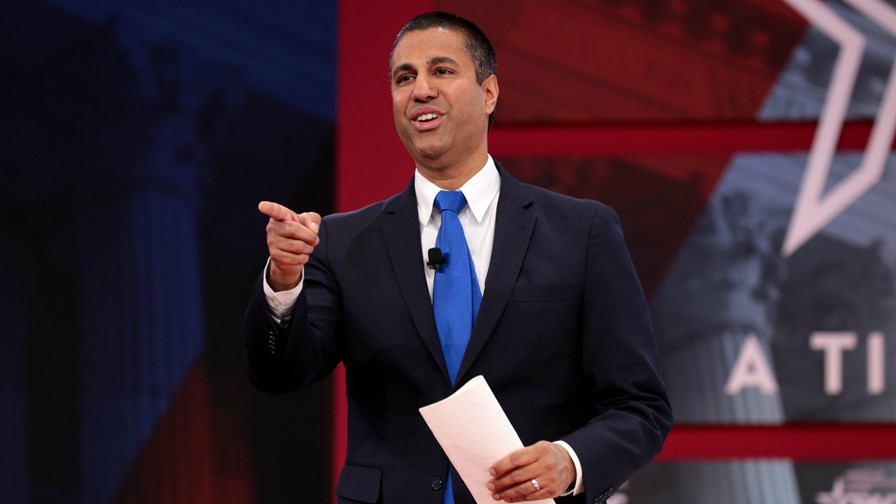
FCC Chairman Ajit Pai via Flickr © Gage Skidmore (CC BY-SA 2.0)
- Intend to re-instate net neutrality rules repealed by the FCC
- "Putting the US consumer first"
- Will push for a federally-funded national broadband plan
- Increased and stringent oversight and policing of the FCC
Although, post the US mid-term elections, the Board of Commissioners of the Federal Communications Commission (FCC), the US telecoms regulator, will maintain its Republican majority, in the lower house of the US Congress, Democrats will be pushing a telecoms programme and agenda greatly at variance with extant Republican policies. There will be a concerted effort to re-instate some, if not all, of the net-neutrality regulations imposed during the presidency of Barack Obama and also an emphasis on the provision of broadband access to the nation's many rural, remote and underserved areas. The stage is being set for at least a two-year war of delay and attrition.
Democrats say they will "put the American consumer first" and will introduce legislation to restore the net neutrality regulations repealed 11 months ago under the remarkably partizan writ of the current Chairman of the FCC, Ajit Pai, and the Republican-dominated Board of Commissioners. The focus will also be on the provision of "meaningful privacy and data security protections that are seriously lacking today." House Democrats also intend to oversee and police the FCC through a regime of regular, compulsory oversight meetings will all of the FCC's Commissioners.
Further, the House of Representatives, now controlled by a Democrat majority, will be "examining with intent to repeal" the media ownership rules that were greatly relaxed by the FCC last year. That could have a profound effect on company media merger and acquisition plans.
Also high on the new political agenda is an enquiry into Ajit Pai's policy which restricts handset resellers from membership of and participation in the FCC's Lifeline programme which grants financial relief to the many millions of poor, low income subscribers via a mandated discount on their monthly phone bills. Speaking before this week's mid-terms Michale Doyle, a Democrat Congressman representing Pennsylvania said, “First off, we will we want to see the FCC in front of us more - and there’s a whole range of issues that we’re going to be interested in discussing.”
Broadband plan might get bi-partizan support in a divided Congress
That's the Democrat's intent, however, while they may well be able to legislate for the repeal of the net neutrality and get a Bill through the House, it wouldn't stand a snowball's chance in hell of getting through the Senate, over which Republicans now have stronger control, and would thus be no more than a symbolic signalling of determination to make life as difficult as possible for the upper House, and for Donald Trump.
On the upside, US commentators are already saying that a House Democrat Bill to increase and expand the deployment of broadband infrastructure and access might just garner sufficient Republican support in the Senate to become law. If that happens, and it won't be before late next year if it does, it could be a rare example of bi-partizan co-operation the like of which is unlikely to be repeated in America's riven legislature.
Democrats say that a national broadband infrastructure plan is vitally important to the US economy and is necessary to ensure the digital enfranchisement of those living in rural communities and underserved inner cities. There is already broad agreement by both political parties that something needs to be done and there has long been talk about legally imposing a so-called "dig once" provision that would require those companies working on federally funded road improvement programmes to dig-in and deploy fibre optic conduits as the roadworks progress.
However, despite the general acceptance that the US needs overarching national legislation to ensure that the build-out of broadband infrastructure accelerates, Republican politicians last year knocked back a Democrat-sponsored US$40 billion plan to do just than and it seems certain that, down the line, arguments over federal funding for broadband deployment will become a political football that will be kicked back and forth between the two houses of Congress for years on end.
The fact of the matter is that Democratic control of the lower house of Congress means that the Trump administration will be unable easily to pass major legislation for at least the next two years. One of the flagship policies which is likely quickly to founder will be the plan to make the the tax cuts, that the Republicans introduced in 2017 and which that benefitted the wealthy the most, will not now be made permanent. However, there is guarded optimism that the administration and the Republican Senate may be able to work together (although not in particular harmony) with the new Democratic majority in the House where broadband infrastructure is concerned. Maybe.
Email Newsletters
Sign up to receive TelecomTV's top news and videos, plus exclusive subscriber-only content direct to your inbox.




